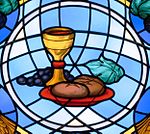
Back Θεία Ευχαριστία στην Καθολική Εκκλησία Greek Eucaristía en la Iglesia católica Spanish Euharistija u Katoličkoj Crkvi Croatian Szentáldozás Hungarian Sakramen Ekaristi (Gereja Katolik) ID Nattvard inom katolska kyrkan Swedish நற்கருணை (கத்தோலிக்கம்) Tamil Bí tích Thánh Thể VI
This article has multiple issues. Please help improve it or discuss these issues on the talk page. (Learn how and when to remove these template messages)
|

| Part of a series on the |
| Eucharist |
|---|
 |
Eucharist (Koinē Greek: εὐχαριστία, romanized: eucharistía, lit. 'thanksgiving')[1] is the name that Catholic Christians give to the sacrament by which, according to their belief, the body and blood of Christ are present in the bread and wine consecrated during the Catholic eucharistic liturgy, generally known as the Mass.[2] The definition of the Eucharist in the 1983 Code of Canon Law as the sacrament where Christ himself "is contained, offered, and received" points to the three aspects of the Eucharist according to Catholic theology: the real presence of Christ in the Eucharist, Holy Communion, and the holy sacrifice of the Mass.[3]
The name Eucharist comes from the Greek word eucharistia which means 'thanksgiving" and which refers to the accounts of the last supper in Matthew 26:26–28, Mark 14:22–24, Luke 22:19–20 and 1 Corinthians 11:23–29, all of which narrate that Jesus "gave thanks" as he took the bread and the wine.[2]
The term Mass refers to the act by which the sacrament of the Eucharist comes into being, while the term Holy Communion refers to the act by which the Eucharist is received.[2]
Blessed Sacrament is a devotional term used in the Catholic Church to refer to the Eucharistic species (consecrated sacramental bread and wine).[4] Consecrated hosts are kept in a tabernacle after Mass, so that the Blessed Sacrament can be brought to the sick and dying outside the time of Mass.[5] This makes possible also the practice of eucharistic adoration.[5]
- ^ Belmonte, Charles (2006). Belmonte, Charles (ed.). Faith Seeking Understanding (PDF). Vol. I (2nd ed.). Mandaluyong, Metro Manila, Philippines: Studium Theologiae Foundation, Inc. p. 524. ISBN 971-91060-4-2. Retrieved April 26, 2023.
- ^ a b c Trese, Leo J. (2000). The Faith Explained. Manila, Philippines: Sinag-Tala Publishers, Inc. p. 348. ISBN 971-554-022-8.
- ^ Moline, Enrique (2006). Belmonte, Charles (ed.). Faith Seeking Understanding (PDF). Vol. I. Mandaluyong, Metro Manila, Philippines: Studium Theologiae Foundation, Inc. p. 525. Retrieved April 28, 2023.
- ^ "Catechism of the Catholic Church - PART 2 SECTION 2 CHAPTER 1 ARTICLE 3". www.scborromeo.org. 1330. Archived from the original on 25 April 2021. Retrieved 26 June 2021.
- ^ a b Moline, Enrique (2006). Belmonte, Charles (ed.). Faith Seeking Understanding (PDF). Vol. I. Mandaluyong, Metro Manila, Philippines: Studium Theologiae Foundation, Inc. p. 534. ISBN 971-91060-4-2. Retrieved April 28, 2023.